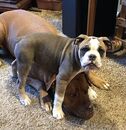Daphnee
New member
9 yo female, had LT TPLO surgery 5 yrs ago, had "40-50%" torn RT ACL, but I don't want to put her thru surgery.. Is it common for a dog to pant more than usual if they're in pain?? Thought I remember hearing that, not sure.. This morning she was lame on right foot, slightly better now. Holding off on giving aspirin, don't want to give rimadyl ( scared of side effects).. Thanks,




